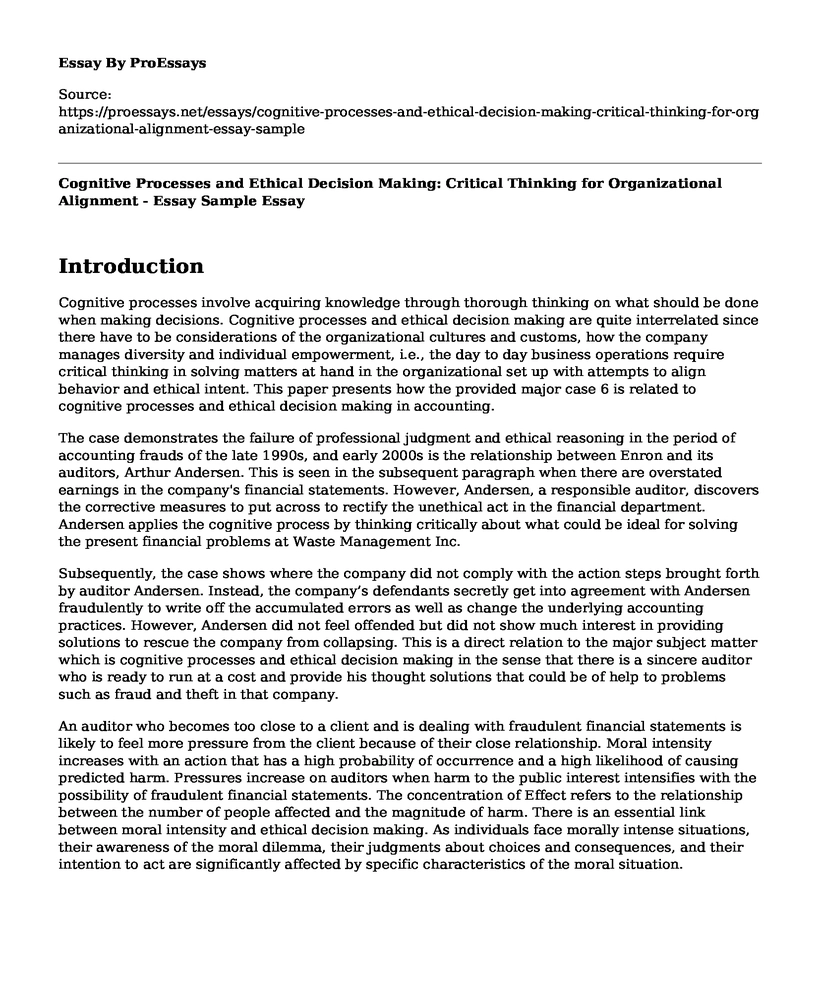Introduction
Cognitive processes involve acquiring knowledge through thorough thinking on what should be done when making decisions. Cognitive processes and ethical decision making are quite interrelated since there have to be considerations of the organizational cultures and customs, how the company manages diversity and individual empowerment, i.e., the day to day business operations require critical thinking in solving matters at hand in the organizational set up with attempts to align behavior and ethical intent. This paper presents how the provided major case 6 is related to cognitive processes and ethical decision making in accounting.
The case demonstrates the failure of professional judgment and ethical reasoning in the period of accounting frauds of the late 1990s, and early 2000s is the relationship between Enron and its auditors, Arthur Andersen. This is seen in the subsequent paragraph when there are overstated earnings in the company's financial statements. However, Andersen, a responsible auditor, discovers the corrective measures to put across to rectify the unethical act in the financial department. Andersen applies the cognitive process by thinking critically about what could be ideal for solving the present financial problems at Waste Management Inc.
Subsequently, the case shows where the company did not comply with the action steps brought forth by auditor Andersen. Instead, the company’s defendants secretly get into agreement with Andersen fraudulently to write off the accumulated errors as well as change the underlying accounting practices. However, Andersen did not feel offended but did not show much interest in providing solutions to rescue the company from collapsing. This is a direct relation to the major subject matter which is cognitive processes and ethical decision making in the sense that there is a sincere auditor who is ready to run at a cost and provide his thought solutions that could be of help to problems such as fraud and theft in that company.
An auditor who becomes too close to a client and is dealing with fraudulent financial statements is likely to feel more pressure from the client because of their close relationship. Moral intensity increases with an action that has a high probability of occurrence and a high likelihood of causing predicted harm. Pressures increase on auditors when harm to the public interest intensifies with the possibility of fraudulent financial statements. The concentration of Effect refers to the relationship between the number of people affected and the magnitude of harm. There is an essential link between moral intensity and ethical decision making. As individuals face morally intense situations, their awareness of the moral dilemma, their judgments about choices and consequences, and their intention to act are significantly affected by specific characteristics of the moral situation.
Conclusion
Cognitive processes involve acquiring knowledge through thorough thinking on what should be done when making decisions in the organization. Waste Management Inc. is the leading company that had unethical practices in its operations, such as improper accounting practices, which included making unsupported changes in depreciation estimates, netting, and sanctions against Andersen, which needed cognitive processes to solve. Even though virtue is a critical component of ethical behavior, other factors may get in the way of taking ethical action, including situational pressures, business norms, and the moral intensity of the issue itself that influences ethical decision making.
References
Guffey, D. M., & Mccartney, M. W. (2008). The perceived importance of an ethical issue as a determinant of ethical decision-making for accounting students in an academic setting. Accounting Education: an international journal, 17(3), 327-348. Retrieved from https://doi.org/10.1080/09639280701272666
Street, M. D., Douglas, S. C., Geiger, S. W., & Martinko, M. J. (2001). The impact of cognitive expenditure on the ethical decision-making process: The cognitive elaboration model. Organizational Behavior and Human Decision Processes, 86(2), 256-277. Retrieved from https://doi.org/10.1006/obhd.2001.2957
Thorne, L. (2001). Refocusing ethics education in accounting: an examination of accounting students’ tendency to use their cognitive moral capability. Journal of Accounting Education, 19(2), 103-117. Retrieved from https://doi.org/10.1016/S0748-5751(01)00014-8
Cite this page
Cognitive Processes and Ethical Decision Making: Critical Thinking for Organizational Alignment - Essay Sample. (2023, Aug 13). Retrieved from https://proessays.net/essays/cognitive-processes-and-ethical-decision-making-critical-thinking-for-organizational-alignment-essay-sample
If you are the original author of this essay and no longer wish to have it published on the ProEssays website, please click below to request its removal:
- Conflict Management for Manager - Course Work Example
- Evaluation Essay on A.S. Watson Group: Change Management and Leadership
- Operational Management at Ford Paper Example
- Essay Example on Pierre Omidyar: A Great Catalyst for Positive Change in Lives
- Essay on NJ Motor Vehicles Commission: Breach of Employee Contract
- Research Paper on Successful IT Leaders: Inspiring Traits & Characteristics
- Paper Example on OSSTMM: Comprehensive Security Testing Methodology Guide







